Criterion have announced their August DVD and Blu-ray line-up, and there are the usual collection of treats to savour, including a trio of silent classics from Joseph von Sternberg, two documentary greats from Terry Zwigoff, the debut feature of Masters of Cinema favourite Marice Pialat, a new edition of a Marcel Camus favourite, and a four-disc set of rarely seen early Kurosawa movies.
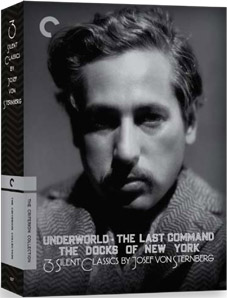
Three Silent Classics by Josef Von Sternberg – Special Edition 3-DVD set – 24th August 2010 – $79.95
Vienna-born, New York–raised Josef von Sternberg (Shanghai Express, Morocco) directed some of the most influential, extraordinarily stylish dramas ever to come out of Hollywood. Though best known for his star-making collaborations with Marlene Dietrich, Sternberg began his movie career during the final years of the silent era, dazzling audiences and critics with his films' dark visions and innovative cinematography. The titles in this collection, made on the cusp of the sound age, are three of Sternberg's greatest works, gritty evocations of gangster life (Underworld), the Russian Revolution (The Last Command), and working-class desperation (The Docks of New York) made into shadowy movie spectacle. Criterion is proud to present these long unavailable classics of American cinema, each with two musical scores.
Featuring new, restored high-definition digital transfers, plus a total of six scores, one by Robert Israel for each film, two by the Alloy Orchestra for Underworld and The Last Command, and a piano and voice piece by Donald Sosin for The Docks of New York. Special features include:
- Two new visual essays: one by UCLA film professor Janet Bergstrom and the other by film scholar Tag Gallagher;
- 1968 Swedish television interview with director Josef von Sternberg, covering his entire career;
- A ninety-six-page booklet featuring essays by film critic Geoffrey O'Brien, film scholar Anton Kaes, and author Luc Sante; the original film treatment for Underworld by Ben Hecht; and an excerpt from Sternberg's autobiography, Fun in a Chinese Laundry, on Emil Jannings.
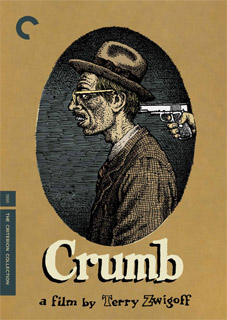
Crumb – DVD and Blu-ray – 10th August 2010 – $39.95 each
Terry Zwigoff's landmark 1995 film is an intimate documentary portrait of underground artist Robert Crumb, whose unique drawing style and sexually and racially provocative subject matter have made him a household name in popular American art. Zwigoff candidly and colorfully delves into the details of Crumb's incredible career, as well as his past, including his family of reclusive eccentrics, some of the most remarkable people you'll ever see on-screen. At once a profound biographical portrait, a riotous examination of a man's controversial art, and a devastating look at a troubled family, Crumb is a genuine American original.
This director-approved Special Edition boasts a new, restored high-definition digital transfer, approved by director Terry Zwigoff, with uncompressed monaural soundtrack on the Blu-ray edition, plus the following extras:
- Two audio commentaries, one from 2010 with Zwigoff, and one from 2006, featuring Zwigoff and critic Roger Ebert;
- Outtakes and deleted scenes;
- Stills gallery;
- A booklet featuring an essay by critic Jonathan Rosenbaum.
Read our review of the Sony Pictures Classics DVD release here.
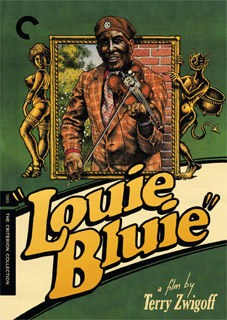
Louie Bluie – DVD – 10th August 2010 – $24.95
Crumb director Terry Zwigoff's first film is a true treat: a documentary about the obscure country blues musician and idiosyncratic visual artist Howard "Louie Bluie" Armstrong, member of the last known black string band in America. As beguiling a raconteur as he is a performer, Louie makes for a wildly entertaining movie subject, and Zwigoff honors him with an unsentimental but endlessly affectionate tribute. Full of infectious music and comedy, Louie Bluie is a humane evocation of the kind of pop-cultural marginalia that Zwigoff would continue to excavate in the coming years.
This director-approved Special Edition features a new, restored high-definition digital transfer, approved by director Terry Zwigoff, plus the following extras:
- Audio commentary featuring Zwigoff;
- Outtakes and deleted scenes;
- Illustrations by Howard Armstrong;
- Stills gallery;
- A booklet featuring an essay by film critic Michael Sragow.
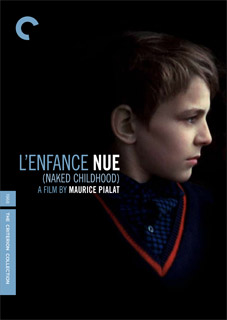
L'Enfance nue – DVD – 17th August 2010 – $29.95
The singular French director Maurice Pialat (Loulou, À nos amours) puts his distinct stamp on the lost-youth film with this devastating portrait of a damaged foster child. We see François (Michel Terrazon), on the cusp of his teens, shuttled from one home to another, his behavior growing increasingly erratic, his bonds with his surrogate parents perennially fraught. In this, his feature debut, Pialat treats this potentially sentimental scenario with astonishing sobriety and stark realism. With its full-throttle mixture of emotionality and clear-eyed skepticism, L'enfance nue (Naked Childhood) was advance notice of one of the most masterful careers in French cinema, and remains one of Pialat's finest works.a new, restored high-definition digital transfer
• L'amour existe, director Maurice Pialat's 1960 short film about life on the outskirts of Paris
• Choses vues, autour de “L'enfance nue,” a fifty-minute documentary shot just after the film's release
• Excerpts from a 1973 French television interview with Pialat
• New visual essay by critic Kent Jones on the film and Pialat's cinematic style
• Video interview with Pialat collaborators Arlette Langmann and Patrick Grandperret
• New and improved English subtitle translation
• PLUS: A booklet featuring an essay by critic Phillip Lopate
The disc features a new, restored high-definition digital transfer;
- L'amour existe, director Maurice Pialat's 1960 short film about life on the outskirts of Paris;
- Choses vues, autour de "L'enfance nue," a fifty-minute documentary shot just after the film's release;
- Excerpts from a 1973 French television interview with Pialat;
- New visual essay by critic Kent Jones on the film and Pialat's cinematic style;
- Video interview with Pialat collaborators Arlette Langmann and Patrick Grandperret;
- New and improved English subtitle translation;
- A booklet featuring an essay by critic Phillip Lopate.
Read our review of the Masters of Cinema UK release here.
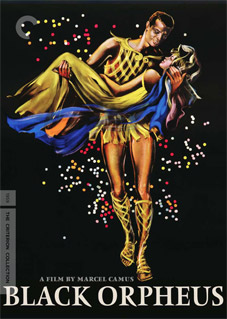
Black Orpheus – 2-disc DVD and Blu-ray – 17th August 2010 – $29.95 (DVD) and $39.95 (Blu-ray)
Winner of both the Academy Award for best foreign-language film and the Cannes Film Festival's Palme d'Or, Marcel Camus' Black Orpheus (Orfeu negro) brings the ancient Greek myth of Orpheus and Eurydice to the twentieth-century madness of Carnival in Rio de Janeiro. With its eye-popping photography and ravishing, epochal soundtrack, Black Orpheus was a cultural event, kicking off the bossa nova craze that set hi-fis across America spinning.
- Featuring a new, restored high-definition digital transfer, with uncompressed monaural soundtrack on the Blu-ray edition, and the following extras:
- Optional English-dubbed soundtrack;
- Archival interviews with director Marcel Camus and actress Marpessa Dawn;
- New video interviews with Brazilian cinema scholar Robert Stam, jazz historian Gary Giddins, and Brazilian author Ruy Castro;
- À la recherche d'“Orfeu negro, a feature-length documentary about Black Orpheus's cultural and musical roots and its resonance in Brazil today;
- Theatrical trailer;
- A booklet featuring an essay by film critic Michael Atkinson.
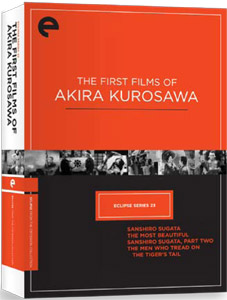
Eclipse Series 23: The First Films of Akira Kurosawa – DVD – 3rd August 2010 – $59.95
Years before Akira Kurosawa changed the face of cinema with such iconic works as Rashomon, Seven Samurai, and Yojimbo, he made his start in the Japanese film industry with four popular and exceptional works, created while World War II was raging. All gripping dramas, those rare early films – Sanshiro Sugata; The Most Beautiful; Sanshiro Sugata, Part Two; and The Men Who Tread on the Tiger's Tail – are collected here, including a two-part martial arts saga, a portrait of female volunteers helping the war effort, and a kabuki-derived tale of deception. These captivating films are a glorious introduction to a peerless career.
Sanshiro Sugata (Sugata Sanshiro, 1943)
Kurosawa's effortless debut is based on a novel by Tsuneo Tomita about the rivalry between judo and jujitsu. Starring Susumu Fujita as the title character, Sanshiro Sugata is a dazzling martial-arts action tale, but it's also a moving story of moral education and enlightenment that's quintessential Kurosawa.
The Most Beautiful (Ichiban utsukushiku, 1944)
This portrait of female volunteer workers at an optics plant during World War II, shot on location at the Nippon Kogaku factory, was created with a patriotic agenda. Yet thanks to the director's groundbreaking semidocumentary approach to the material, The Most Beautiful is a revealing look at Japanese women of the era that anticipates the aesthetics of Japanese cinema's postwar social realism.
Sanshiro Sugata, Part Two (Zoku Sugata Sanshiro, 1945)
Kurosawa's first film was such a success that the studio pressured the director into making a sequel. The result is a hugely entertaining adventure, reuniting most of the major players from the original and featuring a two-part narrative in which Sanshiro first fights a pair of Americans and then finds himself the target of a revenge mission undertaken by the brothers of the original film's villain.
The Men Who Tread on the Tiger's Tail (Tora no o wo fumu otokotachi, 1945)
The fourth film from Kurosawa is based on a sacred twelfth-century incident in which the lord Yoshitsune, with the help of a group of samurai, crossed enemy territory disguised as a monk. The story was dramatized for centuries in Noh and kabuki theater, and here it becomes one of the director's most riveting early films. |